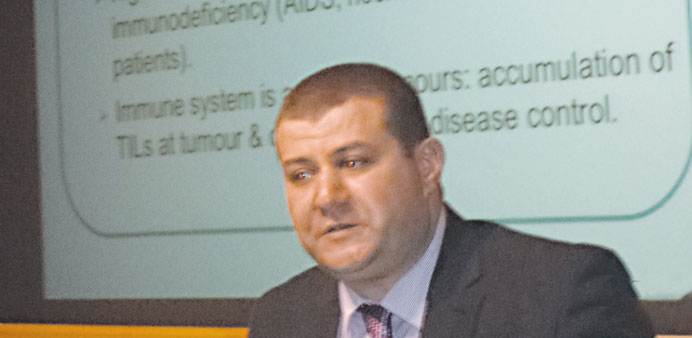Dr Eyad Elkord speaking at a symposium at WCMCQ yesterday.
By Joseph Varghese/Staff Reporter
Immunotherapy is the fourth modality for cancer treatment along with conventional methods like chemotherapy, radiotherapy and surgery, and definitely the best one, an expert has said.
Speaking on ‘Cancer immunotherapy: advances and therapeutic potentials’ at a symposium yesterday, Dr Eyad Elkord, a senior lecturer at University of Salford, University of Manchester and United Arab University, said that immunotherapy is a method used on patients’ immune cells or immune system altogether.
“By immunotherapy, we stimulate the immune cells to reactivate the system and to kill the tumour cells without any impact on the normal cells. Immunotherapy is selective and very much different from chemotherapy. While chemotherapy kills both the normal and tumour cells during the treatment, immunotherapy kills only the tumour cells and the normal cells are left untouched,” he explained.
During a presentation, Dr Elkord highlighted that many cancer patients develop progressive diseases following conventional treatments. “More effective therapies are certainly needed. Activating the immune system for therapeutic benefits has long been a strategic goal for immunologists and oncologists.”
He pointed out that different specific-immunotherapeutic modalities, including cancer vaccines and adoptive transfer had been developed and examined in different phases of clinical trials. “After decades of disappointment, the success of recent clinical trials has placed immunotherapy as an increasingly important component of cancer therapy that should be further developed and explored,” he added.
Dr Elkord said that immunotherapy is the fourth modality for cancer treatment along with chemotherapy, radiotherapy and surgery. “We cannot exclude the existing methods of treatment altogether but immunotherapy is an additional method and the most advanced one. It is the most advanced method of cancer treatment and so far the best. It is the future of cancer treatment and should be used in combination with other methods.”
Dr Elkord observed that cancer deaths are on the increase in the Middle East due to various reasons. “There are a number of factors and conditions for the increase in cancer cases. But the most disappointing factor is that people are scared to go to the clinicians and undergo various tests to identify the disease. If they undertake regular tests, most of the deaths can be prevented as the disease can be identified at the early stages,” he said.
He was highly appreciative of Qatar for its initiatives in science research activities in various fields. “Qatar has set a great example for other countries by using its resources for generating good research in science and technology. There are great efforts for research in the country. Qatar has established many research institutes with sincere intentions to undertake research in various fields and help the humanity.”
The symposium was organised by Qatar Biomedical Research Institute (QBRI) at Weill Cornell Medical College in Qatar (WCMCQ).

